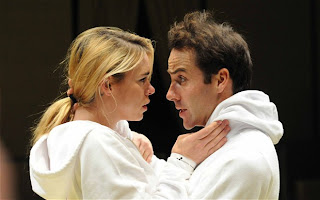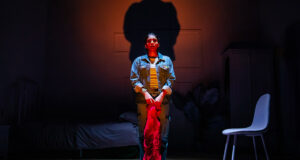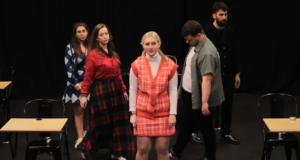Lucy Prebble
Directed by Rupert Goold
★★★★
Pros: Excellent performances, a beautiful, clinical design and a script that proves Prebble isn’t a one trick pony.
Cons: Prebble clearly has an opinion about the issues involved, and consequently it can feel more like a lecture than an exploration in places.
Our Verdict: Another excellent Cottesloe production from the NT and Headlong. Definitely worth seeing for the emotional journeys, even if you have no interest in the topic of mental illness and neuroscience.
 |
| Credit: Alastair Muir |
When your last play is ENRON, which had a successful West End transfer (and a rather less successful Broadway one…) the pressure is on to come up with the goods. Lucy Prebble’s latest play doesn’t have the same sweeping scale, but it does have the same heart, the same passion to explore why things are they way they are. Both plays ask what has led us, both on a societal and a human level, to our current view of things, and this time the topic she’s tackling is the interplay between neuroscience, mental illness and medicine.
The Effect is set at a medical research facility, where a new class of anti-depressant is being tested on several young, seemingly mentally-well people, including Tristan (Jonjo O’Neill) and Connie (Billie Piper). When the back of Lorna (Anastasia Hille), the doctor monitoring them, is turned, and with ever increasing doses of the anti-depressant flowing around their body, Tristan and Connie become embroiled in an intense affair. It’s only when they start to question what’s real emotion and what’s the consequences of the drugs they’re taking that things slip from intense to dangerous.
The play sets out to challenge the increasing acceptance of anti-depressants as successful drugs, and Prebble is clearly less willing than some to accept their role in modifying mood. It’s not an easy argument for lots of people to hear – many of us who’ve used anti-depressants or seen their action in friends and family will acknowledge that while they are no wonder drug, there are some situations in which they can change lives. I’ve spent a fair amount of time with psychiatrists and I don’t know of any that wouldn’t fully agree with Toby (Tom Goodman-Hill); used alone anti-depressants aren’t going to magically solve problems. In fact, studies show that in the long-term talking therapy is just as effective as medication. However, for many people they play an important role in tackling the illness.
Perhaps that isn’t Prebble’s point. Perhaps what she is actually attempting to have Lorna communicate is that these people aren’t unwell at all, and that what we really need is a greater acceptance of the breadth of human emotional experience so as to avoid labelling someone as depressed when they’re a bit down. I know very few people who reject the label of depression once proffered– rather the reverse, many people cling to it as an answer for why they feel like they do. I worry that attitudes like Prebble’s fuel the argument that physical and mental health are intrinsically different, an argument that has led to a chronic under funding in the mental health sector.
But while I can’t fully agree with the case the play makes, that isn’t to say that I can’t see it’s an important question to ask, and if you’re going to do it as beautifully as this you’ll have no arguments from me. Well, fewer. The design of the show is gorgeous – the stalls become encompassed into the body of the facility, and the impersonal, clinical features of so many corporate buildings is wonderfully depicted with stark lines and bright lighting. Some excellent projection, great sound design and lovely movement, choreographed by Aletta Collins, means this play shares the stylish flair of ENRON while being a far more personal story.
All four performers were excellent, but if I’m honest this play felt like it became Anastasia Hille’s. As the doctor monitoring the trial, much of the early part of the play sees her asking questions, administering drugs and monitoring our two triallists. But in her discussions with Toby what unravels is a woman only just holding it together, and you come to realise the cold exterior isn’t just for the benefit of her triallists, but is the only persona her own struggles with depression will allow her to achieve. Her tense, prickly relationship with Toby provides some great scenes, but her monologue, delivered with a brain in her hands is heart wrenching, and by far one of the most accurate depictions of the thought processes of the depressed that I’ve seen on stage.
This is an excellent, interesting and engaging piece from four very talented performers, and I hope it succeeds in getting people thinking about depression and the ways we treat both it and the people who suffer from it.
Please feel free to leave your thoughts and opinions in the comments section below!
The Effect runs at the National Theatre until 23rd February 2013.
Box Office: 020 7452 3000 or book online at http://www.nationaltheatre.org.uk/shows/the-effect
 Everything Theatre Reviews, interviews and news for theatre lovers, London and beyond
Everything Theatre Reviews, interviews and news for theatre lovers, London and beyond


